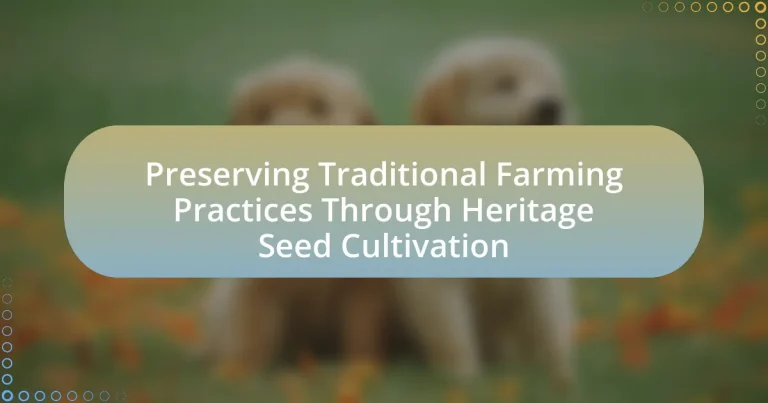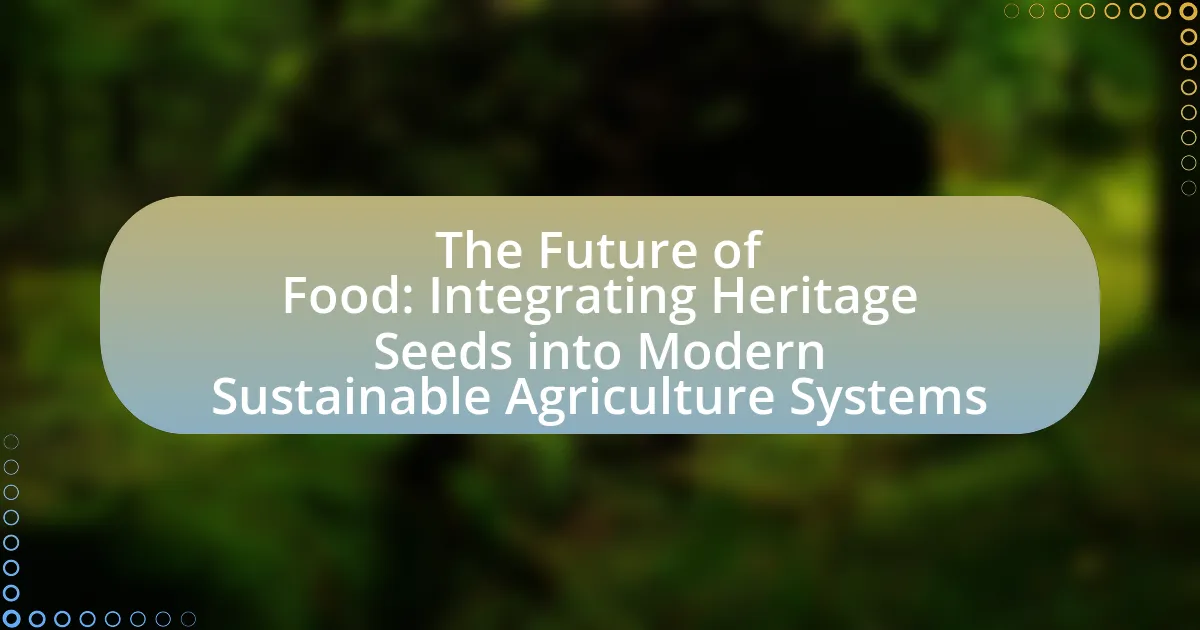Preserving traditional farming practices through heritage seed cultivation is a vital approach that emphasizes the intentional propagation of seeds passed down through generations, thereby maintaining agricultural biodiversity and cultural heritage. This practice supports sustainable agriculture by promoting crop varieties that are well-adapted to local environments, enhancing food security, and fostering resilience against climate change. The article explores the significance of heritage seeds, their role in traditional farming, and the benefits they offer, including improved soil health and reduced reliance on chemical inputs. Additionally, it addresses the challenges faced by farmers in cultivating heritage seeds and highlights the importance of community involvement and educational programs in preserving these practices for future generations.
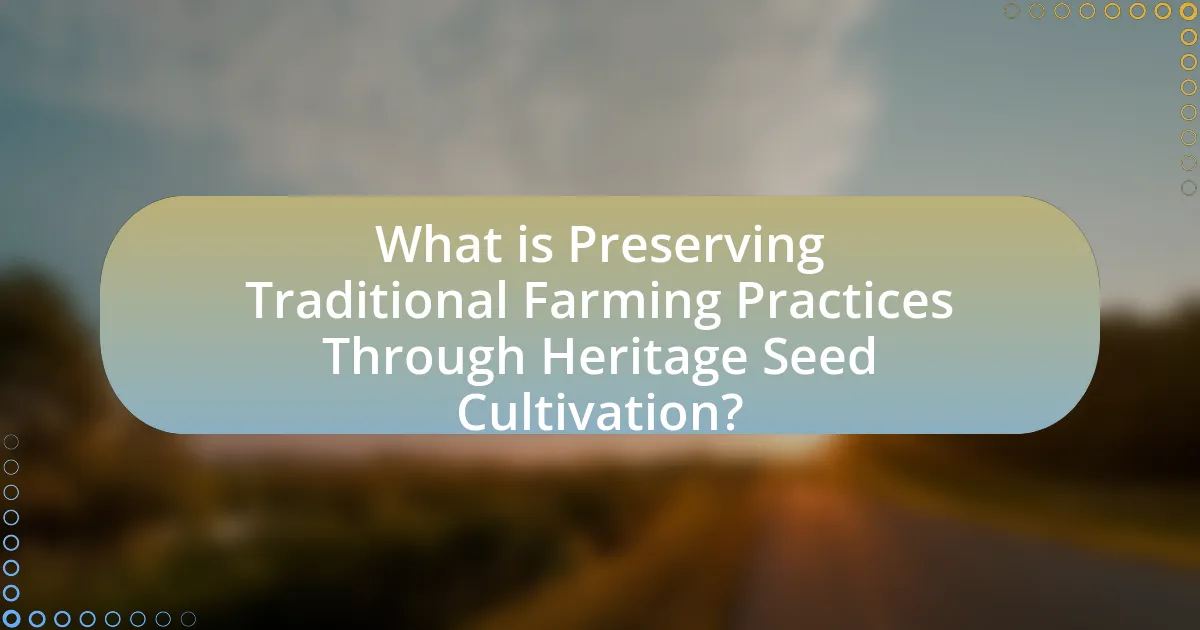
What is Preserving Traditional Farming Practices Through Heritage Seed Cultivation?
Preserving traditional farming practices through heritage seed cultivation involves the intentional cultivation and propagation of seeds that have been passed down through generations, maintaining agricultural biodiversity and cultural heritage. This practice supports sustainable agriculture by promoting crop varieties that are well-adapted to local environments and resistant to pests and diseases. Heritage seeds often have unique flavors and nutritional profiles, contributing to food security and resilience against climate change. Studies indicate that heritage seed cultivation can enhance soil health and reduce reliance on chemical inputs, thereby fostering ecological balance and preserving the knowledge and traditions of local farming communities.
Why is preserving traditional farming practices important?
Preserving traditional farming practices is important because they enhance biodiversity and promote sustainable agriculture. Traditional methods often utilize heritage seeds that are well-adapted to local climates and ecosystems, which can lead to increased resilience against pests and diseases. For instance, studies have shown that diverse cropping systems can reduce the need for chemical inputs, thereby minimizing environmental impact. Additionally, traditional farming practices often incorporate knowledge passed down through generations, which can improve soil health and water conservation. This knowledge is crucial for maintaining food security in the face of climate change, as it provides strategies that have been effective over centuries.
What role do heritage seeds play in traditional farming?
Heritage seeds play a crucial role in traditional farming by preserving genetic diversity and enabling the cultivation of crops that are well-adapted to local environments. These seeds, often passed down through generations, are integral to maintaining traditional agricultural practices and cultural heritage. They contribute to food security by providing resilient varieties that can withstand pests, diseases, and climate variations, thus ensuring sustainable farming. Studies have shown that heritage seeds can yield better results in specific local conditions compared to modern hybrids, which often require chemical inputs and may not thrive in diverse ecosystems.
How do traditional farming practices contribute to biodiversity?
Traditional farming practices contribute to biodiversity by promoting a diverse range of crops and livestock, which enhances ecosystem resilience. These practices often involve the cultivation of heirloom varieties and local species that are well-adapted to specific environments, thereby maintaining genetic diversity. For instance, a study by the Food and Agriculture Organization (FAO) highlights that traditional farming systems can support over 80% of the world’s agricultural biodiversity by preserving thousands of plant varieties that modern agriculture often overlooks. This genetic diversity is crucial for food security and adapting to climate change, as it provides a wider pool of traits for breeding resilient crops.
What are the key characteristics of heritage seeds?
Heritage seeds are characterized by their ability to be open-pollinated, which allows them to reproduce true to type in subsequent generations. These seeds are often heirloom varieties, meaning they have been passed down through generations, typically for at least 50 years, and are valued for their genetic diversity, flavor, and adaptability to local growing conditions. Heritage seeds are not genetically modified and are often grown using organic or sustainable farming practices, which helps preserve traditional agricultural methods. Their cultivation supports biodiversity and contributes to food security by maintaining a wide range of plant varieties that can withstand changing environmental conditions.
How do heritage seeds differ from commercial seeds?
Heritage seeds differ from commercial seeds primarily in their genetic diversity and cultivation practices. Heritage seeds are open-pollinated varieties that have been passed down through generations, often adapted to local climates and conditions, while commercial seeds are typically hybrid varieties engineered for uniformity, higher yields, and resistance to pests and diseases. Heritage seeds maintain a broader genetic base, which can enhance resilience to environmental changes, whereas commercial seeds often require specific agricultural inputs and practices to thrive. This distinction is crucial for preserving traditional farming practices, as heritage seeds promote biodiversity and sustainable agriculture.
What are the benefits of using heritage seeds in farming?
Heritage seeds offer numerous benefits in farming, including enhanced biodiversity, improved resilience to pests and diseases, and the preservation of traditional agricultural practices. These seeds are often better adapted to local climates and soil conditions, which can lead to higher yields and reduced reliance on chemical inputs. Research indicates that heritage varieties can contribute to sustainable farming by promoting soil health and reducing erosion, as they often have deeper root systems compared to hybrid seeds. Additionally, using heritage seeds helps maintain genetic diversity, which is crucial for food security and adapting to climate change.
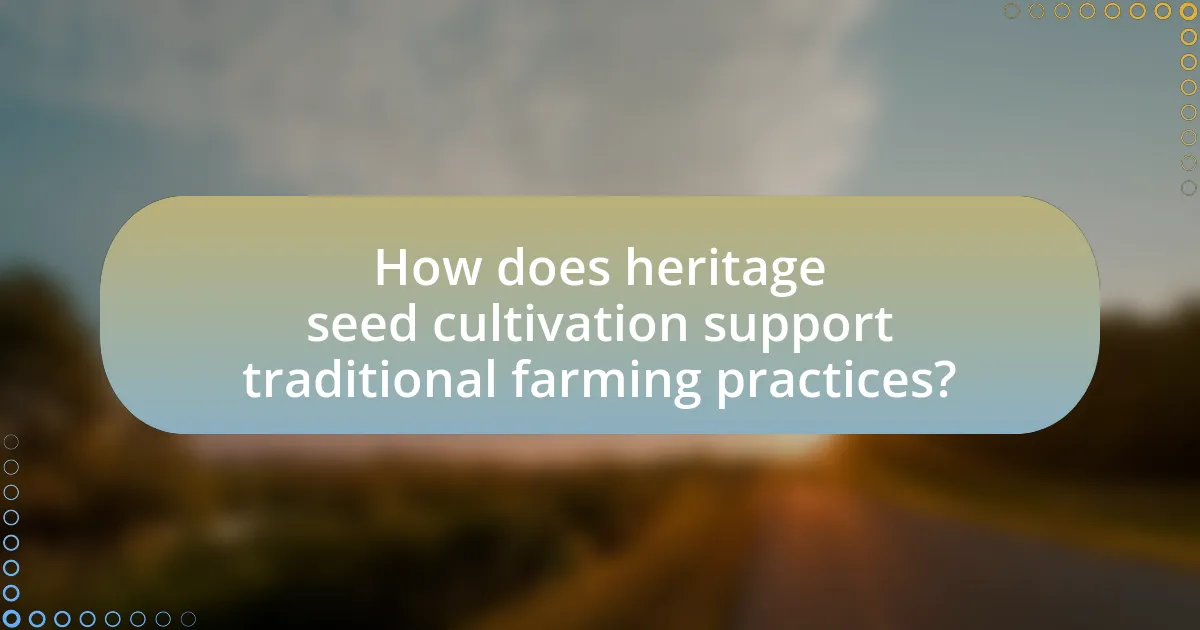
How does heritage seed cultivation support traditional farming practices?
Heritage seed cultivation supports traditional farming practices by preserving genetic diversity and promoting sustainable agricultural methods. This cultivation method allows farmers to maintain heirloom varieties that have been passed down through generations, ensuring that local adaptations to climate and soil conditions are retained. For instance, heritage seeds often require fewer chemical inputs and are more resilient to pests and diseases, aligning with traditional practices that emphasize ecological balance. Additionally, studies have shown that farms utilizing heritage seeds can enhance soil health and biodiversity, which are key components of sustainable farming systems.
What methods are used in heritage seed cultivation?
Heritage seed cultivation employs methods such as seed saving, organic farming practices, and crop rotation. Seed saving involves collecting seeds from mature plants to ensure the preservation of specific traits and genetic diversity. Organic farming practices, which avoid synthetic fertilizers and pesticides, promote soil health and biodiversity, essential for maintaining heritage varieties. Crop rotation helps prevent soil depletion and reduces pest and disease pressure, further supporting the sustainability of heritage seeds. These methods are rooted in traditional agricultural practices that have been passed down through generations, ensuring the continued availability of diverse plant varieties.
How can farmers effectively cultivate heritage seeds?
Farmers can effectively cultivate heritage seeds by implementing organic farming practices, ensuring biodiversity, and utilizing traditional knowledge. Organic farming practices, such as avoiding synthetic fertilizers and pesticides, promote healthy soil and plant growth, which is essential for the success of heritage seeds that often thrive in natural conditions. Ensuring biodiversity through crop rotation and intercropping helps maintain soil health and reduces pest outbreaks, which is crucial for the resilience of heritage varieties. Additionally, utilizing traditional knowledge, passed down through generations, allows farmers to understand the specific needs and characteristics of heritage seeds, enhancing their cultivation success. Studies have shown that farms practicing these methods report higher yields and better crop quality, reinforcing the effectiveness of these approaches in heritage seed cultivation.
What challenges do farmers face in heritage seed cultivation?
Farmers face several challenges in heritage seed cultivation, including limited access to seeds, lack of market demand, and regulatory hurdles. Limited access to heritage seeds often arises from the dominance of commercial seed varieties, which can restrict farmers’ ability to obtain diverse and locally adapted seeds. Additionally, the lack of market demand for heritage crops can discourage farmers from investing time and resources into their cultivation, as these crops may not yield the same financial returns as conventional varieties. Regulatory hurdles, such as stringent seed certification processes, can further complicate the cultivation of heritage seeds, making it difficult for farmers to navigate the legal landscape. These challenges collectively hinder the preservation of traditional farming practices associated with heritage seed cultivation.
Why is community involvement crucial in preserving these practices?
Community involvement is crucial in preserving traditional farming practices through heritage seed cultivation because it fosters a collective commitment to maintaining agricultural biodiversity. When local communities actively participate, they contribute knowledge, share resources, and engage in practices that sustain these heritage seeds, which are vital for food security and cultural identity. Studies show that community-led initiatives can increase the resilience of farming systems, as seen in regions where local farmers collaborate to conserve and propagate traditional varieties, ensuring their survival against industrial agriculture pressures.
How can local communities support heritage seed initiatives?
Local communities can support heritage seed initiatives by actively participating in seed saving and sharing programs. These programs allow community members to collect, preserve, and distribute heritage seeds, which helps maintain genetic diversity and traditional agricultural practices. For instance, community gardens can serve as platforms for growing and exchanging these seeds, fostering local knowledge and skills related to traditional farming. Additionally, educational workshops can be organized to raise awareness about the importance of heritage seeds, encouraging more individuals to engage in sustainable practices. Research indicates that community involvement in seed initiatives can significantly enhance biodiversity and resilience in local food systems, as seen in various successful projects worldwide.
What role do educational programs play in this preservation effort?
Educational programs play a crucial role in the preservation of traditional farming practices through heritage seed cultivation by educating communities about the importance of biodiversity and sustainable agriculture. These programs provide knowledge on seed saving techniques, the historical significance of heritage seeds, and the ecological benefits of maintaining diverse crop varieties. For instance, studies have shown that educational initiatives can increase community engagement and participation in seed preservation efforts, leading to a greater understanding of agricultural heritage and its relevance to food security. By fostering awareness and skills, educational programs empower individuals to actively contribute to the conservation of traditional farming practices.
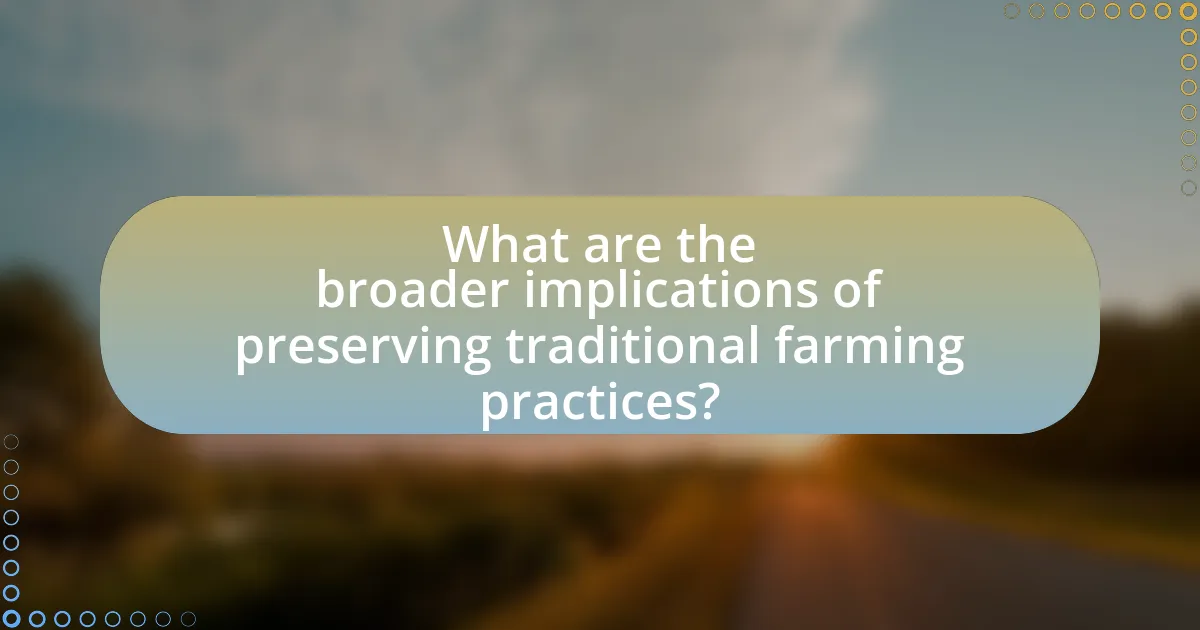
What are the broader implications of preserving traditional farming practices?
Preserving traditional farming practices has significant implications for biodiversity, food security, and cultural heritage. These practices contribute to the conservation of diverse plant varieties, which enhances ecosystem resilience and adaptability to climate change. For instance, traditional farming often utilizes heirloom seeds that are better suited to local conditions, promoting sustainable agriculture. Additionally, these practices support local economies by maintaining small-scale farms and preserving indigenous knowledge, which is crucial for community identity and cultural continuity. Studies have shown that regions that maintain traditional farming methods experience greater agricultural diversity, which is essential for food security in the face of global challenges.
How does preserving traditional farming impact food security?
Preserving traditional farming enhances food security by maintaining biodiversity and ensuring the availability of diverse crops. Traditional farming practices often involve the cultivation of heritage seeds, which are well-adapted to local climates and conditions, thus increasing resilience against pests, diseases, and climate change. For instance, a study by the Food and Agriculture Organization (FAO) highlights that traditional varieties can yield better under stress conditions compared to modern hybrids. This biodiversity not only provides a buffer against food shortages but also supports local economies and cultural heritage, further stabilizing food systems.
What are the long-term benefits of maintaining diverse seed varieties?
Maintaining diverse seed varieties offers long-term benefits such as enhanced resilience to pests and diseases, improved adaptability to changing climate conditions, and the preservation of genetic diversity essential for food security. Diverse seed varieties contribute to agricultural sustainability by ensuring that crops can withstand environmental stresses, which is critical as climate change continues to impact farming practices. For instance, studies have shown that farms utilizing a variety of seeds can reduce crop failure rates by up to 50% compared to monoculture systems, highlighting the importance of genetic diversity in mitigating risks associated with agriculture.
How can traditional farming practices influence sustainable agriculture?
Traditional farming practices can significantly influence sustainable agriculture by promoting biodiversity and enhancing soil health. These practices often involve crop rotation, intercropping, and the use of organic fertilizers, which contribute to a more resilient agricultural ecosystem. For instance, studies have shown that traditional methods can increase soil organic matter by up to 30%, improving nutrient retention and reducing the need for chemical inputs. Additionally, the preservation of heritage seeds through traditional farming ensures genetic diversity, which is crucial for adapting to climate change and pest resistance. This approach not only sustains agricultural productivity but also supports local communities and economies, reinforcing the importance of traditional knowledge in modern sustainable practices.
What practical steps can individuals take to support heritage seed cultivation?
Individuals can support heritage seed cultivation by actively participating in seed saving, which involves collecting and preserving seeds from heirloom plants for future planting. This practice not only maintains genetic diversity but also helps sustain traditional agricultural methods. Additionally, individuals can educate themselves and others about the importance of heritage seeds through workshops and community events, fostering a culture of appreciation for biodiversity. Supporting local farmers who grow heritage varieties by purchasing their produce directly contributes to the preservation of these seeds. Furthermore, individuals can join or establish community gardens that focus on heritage crops, creating a collaborative environment for cultivation and knowledge sharing. Engaging with organizations dedicated to seed preservation, such as Seed Savers Exchange, can also amplify efforts to protect these vital agricultural resources.
How can consumers promote the use of heritage seeds in their communities?
Consumers can promote the use of heritage seeds in their communities by actively supporting local farmers who cultivate these seeds and participating in community seed exchanges. By purchasing produce from farmers who use heritage seeds, consumers help sustain traditional agricultural practices and encourage biodiversity. Additionally, organizing or attending workshops and educational events about the benefits of heritage seeds can raise awareness and foster community interest. Research indicates that communities engaged in seed-saving practices can enhance local food security and preserve genetic diversity, which is crucial for resilient agricultural systems.
What resources are available for farmers interested in heritage seed cultivation?
Farmers interested in heritage seed cultivation can access a variety of resources, including seed banks, agricultural extension services, and online platforms dedicated to heritage seeds. Seed banks, such as the Seed Savers Exchange, provide a repository of heirloom seeds and offer guidance on cultivation practices. Agricultural extension services often provide educational resources and workshops focused on heritage seed preservation and cultivation techniques. Additionally, online platforms like the Heritage Seed Library offer catalogs of available seeds and connect farmers with other growers to share knowledge and experiences. These resources collectively support the preservation of traditional farming practices through heritage seed cultivation.
